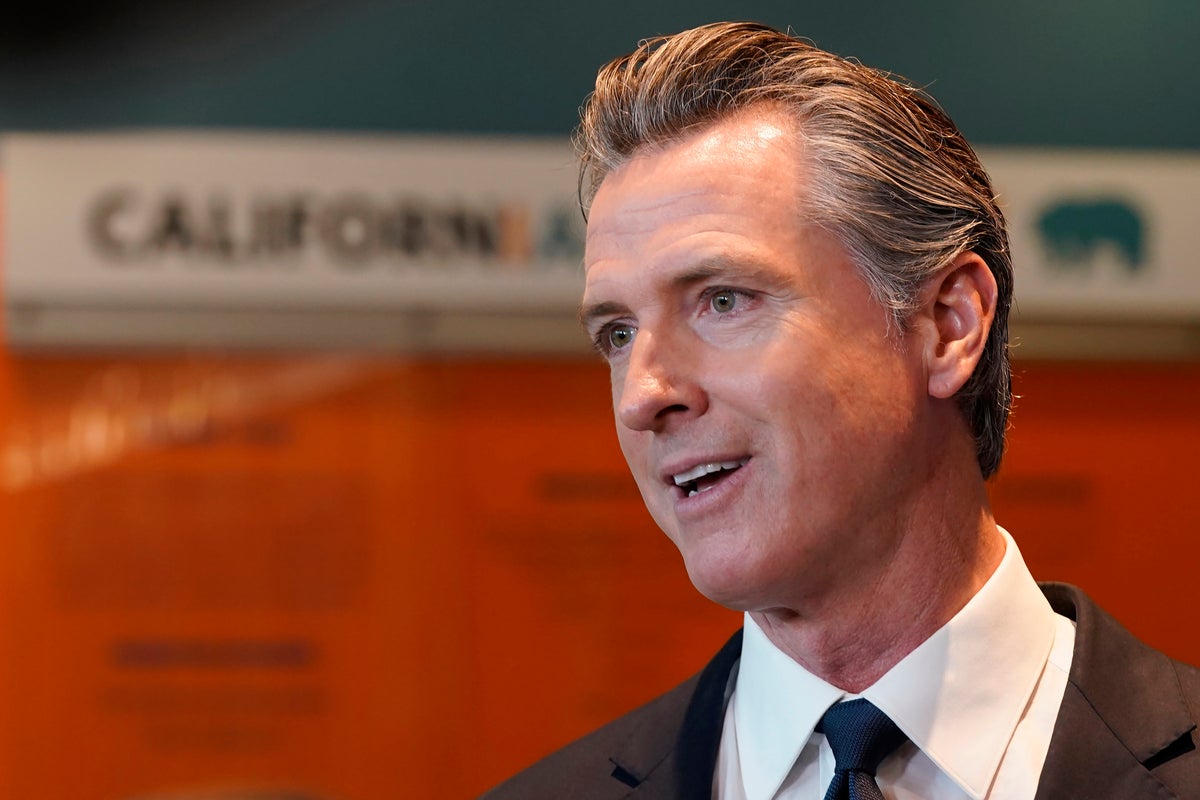
California Gov. Gavin Newsom will kick off his second and final term on Friday by contrasting his leadership of the nation's largest Democratic stronghold with Republican leaders he's branded as threats to freedom and democracy — including former President Donald Trump.
Newsom's inaugural ceremonies will begin with a morning march through downtown Sacramento to the state Capitol. The date — Jan. 6 — was chosen intentionally to mark the second anniversary of the violent attack by Trump supporters on the U.S. Capitol in an attempt to halt Congress from certifying Democrat Joe Biden as president.
The event is meant to “stand in peaceful contrast to the violent insurrection and assault on our democracy which occurred two years ago," Newsom's campaign said.
His second term officially began Monday. The planned outdoor ceremony Friday comes amid a series of massive storms that brought heavy rain, snow and intense winds across the state. The deluge prompted Newsom to declare a state of emergency and offered a reminder of the bread-and-butter work of governing the nation's most populous state.
As Newsom seeks to put California at the center of the national political conversation, he’ll also be challenged to lay out a vision for his second term. He’ll face headwinds in the form of a budget deficit, an unmitigated homeless crisis and drought that may persist despite the storms. And he'll go to battle with the oil industry as he pushes lawmakers to impose fines on company profits.
Newsom began his first term in 2019 with Trump as a clear foil in Washington. With Biden now in the White House, Newsom has pivoted his fire toward fellow governors Ron DeSantis of Florida and Greg Abbott of Texas, both Republicans. He's chided fellow Democrats for not being aggressive enough in standing up to Republicans and has taken the fight to GOP states himself — even launching ads in other states that trash GOP policies and promote California as a safe place for women to seek abortion.
Both Newsom and DeSantis are widely seen as future presidential contenders, though perhaps not against each other. Newsom has committed to supporting Biden if the president seeks a second term, as he currently plans to do. DeSantis, meanwhile, has not ruled out a 2024 run — even as Trump seeks a return to the White House.
Their competing visions of governance — including how best to promote “freedom" — showcase the political polarization that's taken hold across the nation. In his own inaugural address Tuesday, DeSantis touched on national issues like immigration and inflation, and decried “wokeness.”
“They have two starkly different philosophies on how to run a state and that choice will be on the ballot at some point, whether its either one of those two or other folks in their parties,” said Bill Burton, a California political consultant who was a spokesman for former President Barack Obama.
The ongoing drama in Washington that has kept GOP Rep. Kevin McCarthy, a fellow Californian, from securing the speakership in the U.S. House also boosts Newsom's argument that Democrats are better at governing, said Kim Nalder, a professor of political science at the California State University, Sacramento.
“His narrative that he's trying to create is: Look how much better things could be if Democrats ran the political world," she said.
The California Republican Party had a different interpretation, noting that more people are leaving California than moving to the state.
“While we can only hope that Newsom spends a little more time in his second term dealing with the problems he created in the Golden State, we expect he’ll be far too busy chasing laughable White House fantasies and lashing out at red states that countless former Californians are now calling home," Jessica Millan Patterson, chairwoman of the party, said in a statement.
But Californians have twice reinforced their support for Newsom in the past 15 months: first in a 2021 recall attempt that failed and again last November, when he handily won his second term.
Newsom’s first term was dominated by wildfires, a major utility bankruptcy and the coronavirus pandemic, which has killed more than 100,000 Californians, and prompted monthslong shut downs of businesses and schools. But he was also handed a massive budget surplus that allowed him to invest tens of billions in the environment, education, child care and health care.
But he enters his second term with a projected $25 billion budget deficit, which limits what Newsom can spend on and may force budget cuts. He'll offer his first glimpse at spending priorities next week.
He's also geared up for a major fight with the oil industry, convincing the Legislature to launch a special session to consider a new fine on oil company profits. Gas prices climbed above $6 per gallon in California, which is well above the national average.
California is still among the top oil-producing states and the industry continues to hold some sway in the Legislature among lawmakers, including Democrats, who represent oil-rich parts of the state. Newsom, though, has made clear that he wants the state to phase out oil and gas in favor of more climate-friendly energy sources.
The potential budget deficit in particular may force Newsom to turn more of his attention back home if he hopes to maintain the strong support he's so far enjoyed, said Sarah Hill, a professor of political science at the California State University, Fullerton, who focuses on state politics.
“If he still is sort of playing this national stage while the state is hurting fiscally and they're having to make cuts, I don't think that will play well," she said.







